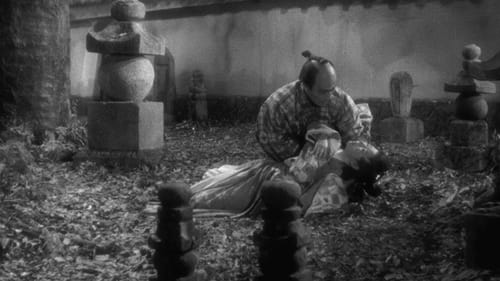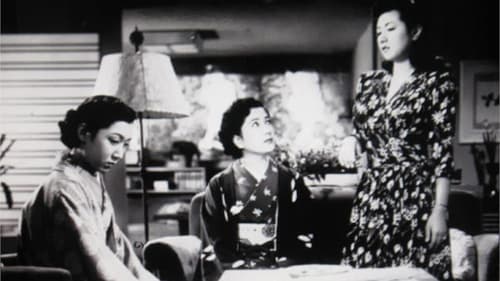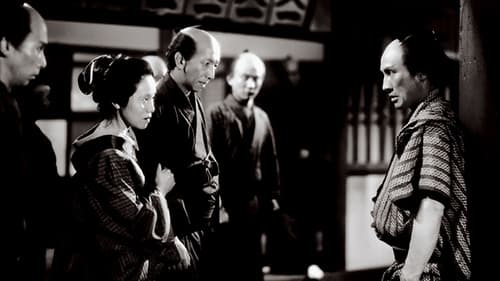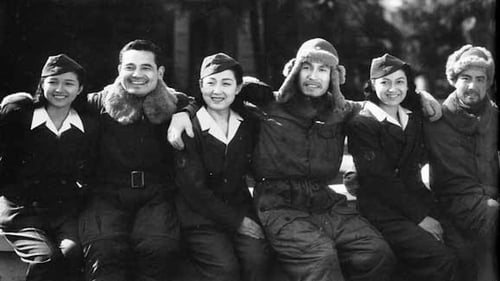Hisako Yamane
Birth : 1921-04-11, Tokyo, Japan
Death : 1990-09-15

Sato

Tomiko Takagi
The young Takako Kuramoto has come to Tokyo to study and starts working for the rich Tashiro family as tutor of the daughter, Kumiko, while she receives attention from her two older brothers, Yukichi and Shinji. Meanwhile, the exact parentage of Shinji comes to light.

Yurie
Harsh film about a car dealer who gets into financial trouble.

Tatsuko Iwata
A conflict between two yakuza families in Tokyo, the Izus and the Yoshidas, has recently broken out. When an Izu underling starts a fight with a Yoshida man, Fuyu, the Izu family sends Tsuruta, a senior member of the clan, to make a personal apology to Fuyu. Tsuruta discovers that the woman he is in love with is Fuyu's sister, Tatsuko. Tsuruta ends up gambling with a swindler, who is in fact Tatsuko's husband. (The general plot of the film was re-used for Seijun Suzuki's Kanto Wanderer).

1956 Japanese film, originally released in three parts.

Fumiyo

Upon discovering that her father has a mistress, a young girl befriends the "other woman" and her child. Realizing that her half-sister is doomed to being regarded as an outcast, the heroine sets about to spiritually legitimize the girl.

Chizu
Mokichi is the widowed father of three daughters, with whom he lives on the premises of a temple since the war. In the film all three daughters become involved in some sort of complicated relationships. The sisters and their attached Men are deliberately designed as allegorical figures on the changing social conditions. A wonderfully funny, sometimes droll comedy between Nara and Tokyo, Adagio and Allegro, Yesterday and Today - in search of a morning.

Historical drama about two samurai who fight over everything yet unite together to fight an evil lord.

Japanese film released to commemorate the 7th anniversary of Shintoho's founding.

Dai-ni-bu: Aijô ruten: Kiyoshi Saeki directed movie

Dai-ichi-bu: Dôkai-wan no rantô - Kiyoshi Saeki directed movie.

Michiko Asakura was married to the eldest son of the Sakuma family, an unsealed family in Shinshu, but died from her husband and returned to her parents' house in Tokyo with her five-year-old daughter Yoshiko.

The Wife

Jidai-geki by Kiyoshi Saeki

Once an average and seemingly ordinary Tokyo girl, she suddenly finds herself as a TV star owing to her discovery by a casting company, which noticed photographs that her cousin had sent. When another actress falls ill she is given the role instead. Her first film is a success propelling the young actress to popularity, her own fans, money and a house. While everything looks dandy from the outside not all is well within the family however.

Lady Matsudaira
In Edo Period Japan, a noblewoman's banishment for her love affair with a lowly page signals the beginning of her inexorable fall.

Takako Ariyasu
Bittersweet shomin-geki drama by Keigo Kimura

Oshin
Period film about the legendary detective Umon

Mrs. Shimako
Melodrama by Kon Ichikawa

A young lord joins gang of Robin-esque robbers.

1951 Japanese movie

Yukiko

Kinoe
An early film by Kon Ichikawa

Oume
Iemon Tamiya is an impoverished masterless samurai who craves a better life, which he cannot have because of his marriage to Oiwa, who is completely devoted to her husband.

Hanae
Japanese mystery thriller.

Teruko Oe
A young man rents an apartment in Tokyo and discover it was built by his father. He falls in love with the daughter of the mistress of the house and decides to marry her. Only to discover that his father is is in debt and wants him to marry Ranko so that she may help his company by granting 1.5 million yen. Teruko decides to borrow money from a greedy bar owner who lends her money on certain conditions and photographs her without her consent. A love traingle forms between Koroku, Ranko, and Teruko. Things complicate when Koroku marries Teruko and Tsugawa threatens them for the money causing many twists and turns.

Aono's eldest daughter, Hatsuko
A comedy about two salarymen who routinely degrade themselves for their boss.

Otoko Goda
Reputedly based on Frank Capra’s 1939 film Mr. Smith Goes to Washington, A Descendant of Tarô Urashima is about a repatriated soldier who becomes populist politician in the Japanese Happiness Party.

The story of an airport and its air traffic control crew in a remote and northern Japanese town. Three of the air traffic controllers are female with one of them working with her dead fiancé's sister. The engaged man had gone to war and never returned.

Based on a short story by Dazai Osamu, produced under the national film law. The film's hero falls in love with the youngest daughter of a family he is visiting to arrange an engagement for his friend who has been drafted to fight in the war.

1944 war movie

It is 1921 and a town has a newspaper which prints urgent bulletins as required. The Washington-based CITES treaty, in which Japan participates, puts a limit on the number of warships any country can possess. As a result, Japan has to decommission a ship to its makers' disappointment. An institute of technology's laboratory designs a new ship. Due to less ships, sailors have to retire and are also disappointed. The laboratory's manager and an admiral are visiting a patient at a hospital and meet coincidentally. The former has a daughter who worries about her father's workload. She asks him to accompany her to a concert. Father has little time, but is convinced for her sake. He is inspired for a ship's design at the performance. The film is inspired by the life of Jo Hiraga.

A small community in wartime Japan learn how to make do with less.

Hanako's sister-in-law
Hanakosan (1943, TOHO, MAKINO Masahiro), a thoroughly light and joyful musical comedy, influenced by Busby Berkeley films, against the national policy under the wartime, was made into a film from comic serials by SUGIURA Yukio published in a magazine.

A 1942 film.

1942 adaptation of Izumi Kyoka's novel.

A bizarre murder at a hot springs resort threatens to disrupt an Edo detective's (Hasegawa) vacation. When his hot-blooded wife (Yamada) starts snooping around, however, he finds himself reluctantly drawn in to the case.

Toragoro's daughter

The story is based on the serial novel by Tsunoda Kikuo.

The story is based on the serial novel by Tsunoda Kikuo.

Ice shop lady
This film depicts a troupe of wandering kabuki players traveling through rural Japan.

The only son of a sushi chef hates sushi and decides to leave home to search for a job and make his own way.

Song of the White Orchid was a co-production of Toho and Mantetsu, the railway that served the colonial region of Manchuria, and the first film in the Kazuo Hasegawa/Shirley Yamaguchi (Ri Koran) “Continental Trilogy.” Handsome Hasegawa (representing Japan) runs up against an impertinent Yamaguchi (representing the continent); not surprisingly, in the course of the film the woman comes around and realizes the benevolent intentions of the Japanese. In Song of the White Orchid Yamaguchi leaves Hasegawa, who plays an expatriate working for the railway, because of a misunderstanding. She joins a communist guerilla group plotting to blow up the Manchurian railway. Learning of the subterfuge that led to the misunderstanding, she renews her faith in Hasegawa—and by extension Japan—and tries to undermine the plot.

Japanese war movie


















